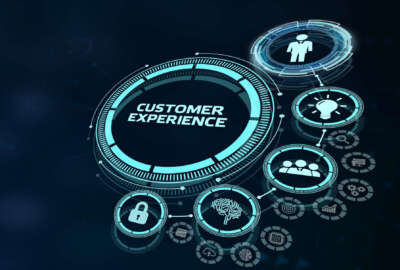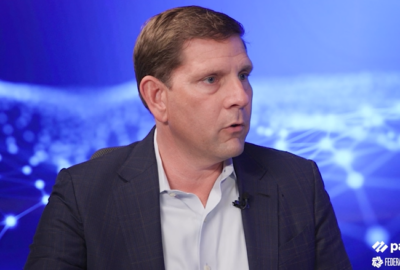Hubbard Radio Washington DC, LLC. All rights reserved. This website is not intended for users located within the European Economic Area.
A university creates an artificial intelligence institute, partly to help government
The University of Maryland has launched of a new institute dedicated to developing the next generation of artificial intelligence people.
The University of Maryland has launched of a new institute dedicated to developing the next generation of artificial intelligence people. The Artificial Intelligence Interdisciplinary Institute will support research focusing on responsible and ethical AI across industry and government. For details on the Federal Drive with Tom Temin, Federal News Network’s Eric White spoke to the institute’s director, Professor Hal Daume.
Interview Transcript:
Hal Daume Approximately the institute got started because last summer the provost came to us and said, what would it look like to have an institute that crosses all of campus and sort of unifies AI everywhere and research and education. And so we had a working group last summer that put together a vision document of what that might look like and what it would take. And I have to say, somewhat surprisingly, maybe for a public university, less than six months later, we actually have an announcement of a new thing. And I think this is both sort of a sign of the times. This is, I think, a really important topic that lots of people are thinking about. But I also think it’s also a signal that our president and provost are really good at moving fast when things are important.
Eric White Let me reiterate their question to you. What would it look like and what is this institute going to include?
Hal Daume The goal here really is to think about how do we take AI, which is something that’s, I think pretty clearly affecting almost everything these days. And think about it not just sort of from the perspective of like computer science or engineering, which is where it kind of historically has lived. And really think about it from the perspective of both the sort of different career paths that students might take. What does it look like to be a journalist in five years, what it looks like to be a professor in five years, but also like the expertise on campus. And I think one of the reasons this is really important is, I think the big AI challenge that we face over the next ten years is how do we figure out how to build AI systems that reflect human values, that promote the well-being of humanity, that sort of like do good in the world? And these questions of like, what are human values? Like what happens to society? These are questions like humanists study and social sciences study. These are not traditionally questions that computer scientists study. And so like if we want to answer these questions, I think it’s really essential that, kind of everyone is at the table as an equal player.
Eric White So is this institute going to focus more on the ethics of AI use and development rather than the actual creation of it, or is it going to be a little bit of both?
Hal Daume I think the goal is that it’s a little bit of both. I think University of Maryland has had a strength in AI sort of research and development, technology development, whatever you want to call it for decades. And so a lot of this is sort of like building on that strength, but also sort of shifting it a little bit so that we’re thinking about not just developing technology for the sake of developing technology, which is, I think, how a lot of maybe engineering mindset people think, but really thinking specifically about like, okay, what is the impact of this technology on people? How do I change my practices and change the type of AI system that I develop so that it’s most likely to have like a positive impact on people?
Eric White We’re speaking with Hal Daume. He is a computer scientist, professor at the University of Maryland and the new director of UMD’s AI Institute. We talk a lot about ethical AI. It is a term that has a different meaning, it seems like, to everyone. And yeah, as you just mentioned in the past it did seem whenever a new technology came along, it was let’s just create it, let’s put it out there and let the chips fall where they may and we’ll see what happens. Do you see as AI as being different because of the magnitude of what its impact could be?
Hal Daume Yeah, I think one of the things that makes AI different, and I guess when I say AI, I really mean sort of like data driven, either decision making or generation of, say, documents or images or something like that. So the data driven I think is the key here. And I think what we’re seeing increasingly is the data is available in a huge wide variety of domains now, which means that the potential for applying sort of this single technology to a wide variety of domains has now become like a practicality. Whereas previous approaches to AI that were maybe not data driven didn’t really have that potential to be broadly applied.
Eric White It just seems as if for the first time the folks who actually are responsible for inventing it and getting it out there for consumer use seem to be the ones that are the most hesitant to say, okay, let’s just, take a pause here for a second. Whereas usually that’s not the case, at least from what I’ve seen as far as just covering technology. But I didn’t know if that was maybe what you experience or how you feel about it.
Hal Daume Yeah. I think that what we see in sort of like technology development in general is really this, like you said, we’ll push it out, we’ll see what happens. And I think there’s a lot of value to this. And I think that lots of really useful technologies have been developed this way. I think what we are coming to realize is that, like a key property, I think of almost any AI system is that it’s not going to be perfect, like all of these data driven systems, they’re sort of doing their best given the data that they’ve seen in the past. And I think unlike a lot of traditional computer science, where, for instance, you can prove that the system I deploy will do X, Y, and Z. Nowadays, we’re in this kind of world where we’re like, well, I hope it does X, Y, and Z. And what we’re seeing is that when it doesn’t, sometimes the mistakes that it makes, which are often really hard to foresee, can have pretty consequential impacts on people’s lives. Like we’ve seen examples of Medicaid getting withheld that led to a big case in Arkansas. And we’ve seen cases of people getting into fistfights over translation errors and all sorts of things where this property of AI that it’s not exactly unique to AI, but I think AI really brings it to the forefront that these systems are just not going to be perfect. And so how do we engineer something around that lets people still use them productively, while also taking into account the fact that, yeah, they’re going to make mistakes. And we need to make sure that those mistakes don’t cause sort of irreparable harm or even large magnitude harm to people.
Eric White Getting back to the Institute. So it sounds as if you’re saying AI is going to be creeping into so many different things that you’re not necessarily just looking for the people that are trying to get into the AI field when they graduate. This could be something for, say, a journalism student or a first year medical student may want to try and get their hands on just to see where exactly the technology lays. Did I make a wrong assumption there?
Hal Daume Yeah, that’s exactly right. So at the undergraduate level, We’re planning on rolling out some degree programs on AI. But in some ways, I think that some of the really exciting stuff is on what I’m kind of calling, like the path to AI, where the idea is that pretty much any freshman who shows up on campus, no matter what your major is, should have a breadth of AI related courses that they can take that will help prepare them for their future career, but also for their future time as a student. Because AI is affecting the lives of students, just like it’s affecting the lives of normal people or non-students. And so I think the the real potential here is how do we build this sort of AI minded future workforce, both among our current students and then also through like professional certificate programs? So people who are current day nurses or current day journalists or current day K-12 teachers or something can come and sort of upskill around AI as it affects their profession.
Eric White Yeah. There’s nothing normal about being a college student. I can attest to that for sure. So, well, what about the folks that are trying to get into the AI field, in particular? Are the jobs that many of the AI, I’ll call them apologists have said that they’ll counterbalance the jobs that are eliminated by AI. Are there going to be actual careers there as far as maintaining and just kind of controlling AI rather than actually doing a job that the AI is actually doing itself?
Hal Daume I think that’s a great question. And I’ll take a step back. When I say that AI is transforming industries, it is also transforming computer science. And we see a bunch of tools I think like GitHub Copilot is probably the one that’s most recognized. There was just an announcement a couple of days ago about a new, sort of software development oriented AI system. And so I think the face of programing itself is changing. And in the same way that we might ask, is there a future career for journalists? Just to pick on you. We can also say, is there a future career for programmers? And I guess I’m an optimist. Like, I think that these jobs will shift and how people will spend their time will shift. But I don’t think that the jobs themselves are going anywhere. One way that I think is useful to think about this is that what AI systems are good at automating is tasks, and one person’s job is not just one task. The easiest example here is, self-driving taxis. A taxi driver, they drive, but they also clean the car, they also talk to passengers. They collect fares. There’s a lot more to this job than just the the single task of driving the car. And so, I think what we might see is shifting of tasks from some things to others. But I don’t think in the short term we’re going to be seeing sort of this large shift of such and such job doesn’t exist anymore.
Copyright © 2024 Federal News Network. All rights reserved. This website is not intended for users located within the European Economic Area.
Eric White
Eric White is news anchor and Federal Drive producer at Federal News Network.
Follow @FEDERALNEWSCAST
Related Stories
Exclusive
Artificial Intelligence
Read more
Related Stories
-
OPM introduces new IT pilot to improve customer experience Artificial Intelligence
-
Agencies start to focus on zero trust ‘outcomes,’ instead of checklists Artificial Intelligence
-
Amid political leadership vacancies, calls for SES reform continue to rise Artificial Intelligence





